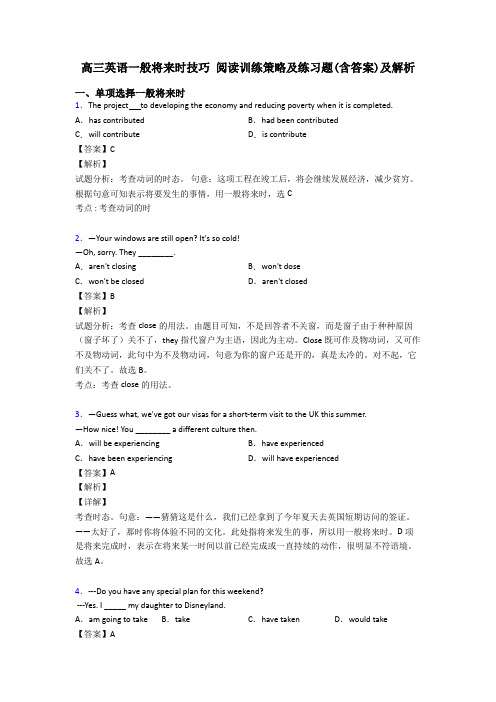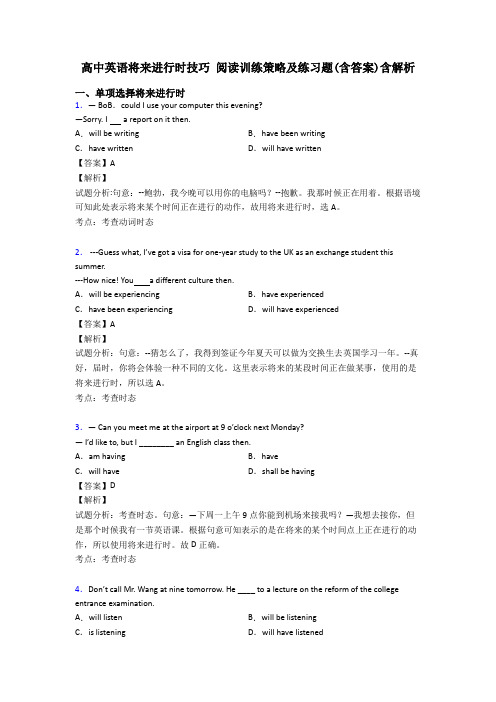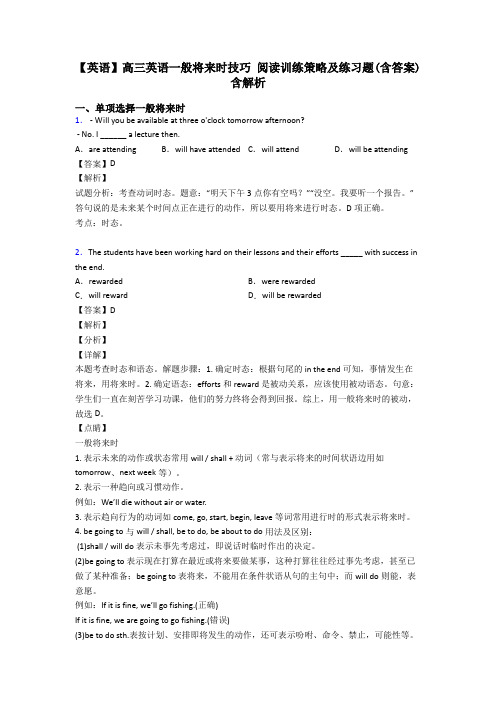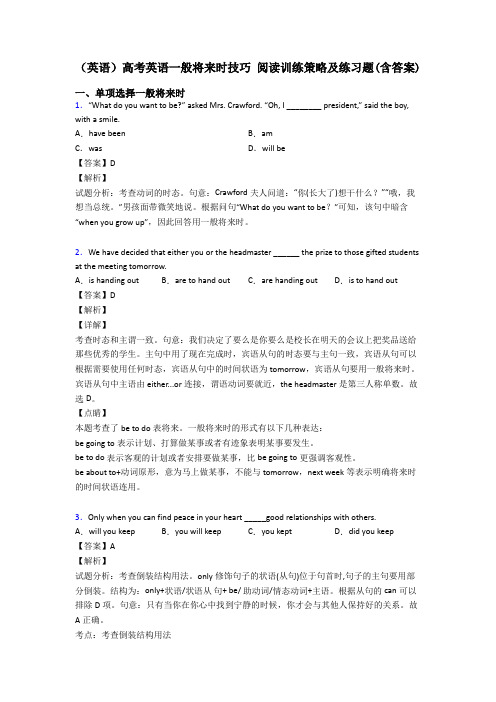高中英语将来进行时技巧 阅读训练策略及练习题(含答案)
- 格式:doc
- 大小:45.00 KB
- 文档页数:7

高三英语一般将来时技巧阅读训练策略及练习题(含答案)及解析一、单项选择一般将来时1.The project to developing the economy and reducing poverty when it is completed. A.has contributed B.had been contributedC.will contribute D.is contribute【答案】C【解析】试题分析:考查动词的时态。
句意:这项工程在竣工后,将会继续发展经济,减少贫穷。
根据句意可知表示将要发生的事情,用一般将来时,选C考点 : 考查动词的时2.—Your windows are still open? It's so cold!—Oh, sorry. They ________.A.aren't closing B.won't doseC.won't be closed D.aren't closed【答案】B【解析】试题分析:考查close的用法。
由题目可知,不是回答者不关窗,而是窗子由于种种原因(窗子坏了)关不了,they指代窗户为主语,因此为主动。
Close既可作及物动词,又可作不及物动词,此句中为不及物动词,句意为你的窗户还是开的,真是太冷的。
对不起,它们关不了。
故选B。
考点:考查close的用法。
3.—Guess what, we've got our visas for a short-term visit to the UK this summer.—How nice! You ________ a different culture then.A.will be experiencing B.have experiencedC.have been experiencing D.will have experienced【答案】A【解析】【详解】考查时态。

高中英语将来进行时技巧阅读训练策略及练习题(含答案)含解析一、单项选择将来进行时1.— BoB.could I use your computer this evening?—Sorry. I a report on it then.A.will be writing B.have been writingC.have written D.will have written【答案】A【解析】试题分析:句意:--鲍勃,我今晚可以用你的电脑吗?--抱歉。
我那时候正在用着。
根据语境可知此处表示将来某个时间正在进行的动作,故用将来进行时,选A。
考点:考查动词时态2. ---Guess what, I’ve got a visa for one-year study to the UK as an exchange student this summer.---How nice! You a different culture then.A.will be experiencing B.have experiencedC.have been experiencing D.will have experienced【答案】A【解析】试题分析:句意:--猜怎么了,我得到签证今年夏天可以做为交换生去英国学习一年。
--真好,届时,你将会体验一种不同的文化。
这里表示将来的某段时间正在做某事,使用的是将来进行时,所以选A。
考点:考查时态3.—Can you meet me at the airport at 9 o’clock next Monday?—I’d like to, but I ________ an English class then.A.am having B.haveC.will have D.shall be having【答案】D【解析】试题分析:考查时态。
句意:—下周一上午9点你能到机场来接我吗?—我想去接你,但是那个时候我有一节英语课。

【英语】高考英语高中英语一般将来时技巧阅读训练策略及练习题(含答案)一、单项选择一般将来时1.–Are you available at 3 tomorrow afternoon?--Sorry, I ________ a meeting at that time.A.am having B.will be having C.will have D.have【答案】B【解析】试题分析:考查时态。
根据时间状语at 3 tomorrow afternoon可知用将来进行时,表示将来时间点正在发生的动作。
句意:——明天下午3点钟你在吗?——对不起,那时候我将正在开会。
故B正确。
考点:考查时态情态动词2.Mrs. Morris has left for London. She ________ a speech there next week.A.has given B.will give C.gives D.gave【答案】B【解析】【详解】考查时态。
句意:Morris女士已经去伦敦了。
她下周将在那儿做一次演讲。
由next week 判断为一般将来时,故选B项。
3.— Did you tell Mother you have passed the exam?— Oh, I forgot. I _______ her now.A.will call B.will be callingC.am calling D.am to call【答案】A【解析】试题分析:考查情态动词。
句意是:你告诉Rose关于考试的事了吗?--哦,我忘了,我现在就打电话给她。
这里用will表示临时决定,故选A项。
考点 : 考查情态动词4.If you _____ his wife’s income____ his own,the total of their income _____ 3000 yuan. A.add; to; will add up to B.add; to; adds toC.add up; to; adds up to D.will add; for; adds up【答案】A【解析】试题分析:考查if引导条件状语从句及词的用法。

【英语】高三英语一般将来时技巧阅读训练策略及练习题(含答案)含解析一、单项选择一般将来时1. - Will you be available at three o'clock tomorrow afternoon?- No. I ______ a lecture then.A.are attending B.will have attended C.will attend D.will be attending 【答案】D【解析】试题分析:考查动词时态。
题意:“明天下午3点你有空吗?”“没空。
我要听一个报告。
”答句说的是未来某个时间点正在进行的动作,所以要用将来进行时态。
D项正确。
考点:时态。
2.The students have been working hard on their lessons and their efforts _____ with success in the end.A.rewarded B.were rewardedC.will reward D.will be rewarded【答案】D【解析】【分析】【详解】本题考查时态和语态。
解题步骤:1. 确定时态:根据句尾的in the end可知,事情发生在将来,用将来时。
2. 确定语态:efforts和reward是被动关系,应该使用被动语态。
句意:学生们一直在刻苦学习功课,他们的努力终将会得到回报。
综上,用一般将来时的被动,故选D。
【点睛】一般将来时1. 表示未来的动作或状态常用will / shall + 动词(常与表示将来的时间状语边用如tomorrow、next week等)。
2. 表示一种趋向或习惯动作。
例如:We’ll die without air or water.3. 表示趋向行为的动词如come, go, start, begin, leave等词常用进行时的形式表示将来时。
4. be going to与will / shall, be to do, be about to do用法及区别:(1)shall / will do表示未事先考虑过,即说话时临时作出的决定。

高二英语将来进行时技巧阅读训练策略及练习题(含答案)含解析一、单项选择将来进行时1.—The new machines have arrived and are being tested in the workshop.—I’m glad we _____ them in the years ahead.A.will be operating B.have been operatingC.would be operating D.had been operating【答案】A【解析】考查时态。
句意:——新机器已经到了,正在车间里被检测。
——我很高兴未来几年我们可以操作它们了。
该句的时间状语为in the years ahead,是表示将来的时间,故该句应用一般将来时态。
故A选项正确。
A选项中的将来进行时相当于一般将来时,表示将来某个时间正在进行的动作。
2. Ladies and gentlemen, due to an unexpected accident, one of the singers who all of you______ to hear ______ tonight.A.had come; don’t performB.come; won’t performC.have come; won’t be performingD.came; wouldn’t perform【答案】C【解析】试题分析:考查时态。
第一空表示“已经听说”,故用现在完成时;由 tonight 可知,第二空应用将来进行时,表示“因意外事故,一位歌手将不能演出”。
句意:先生们女士们,由于意想不到的事故,你们所有人都听说过的其中一位歌手今晚将不来表演了。
故C正确。
考点:考查时态3.–Guess what! We’ll have a chance to visit our sister school in Denmark this summer!--How nice! You ______ a different culture then.A.will have experienced B.have been experiencingC.will be experiencing D.will have to experience【答案】C【解析】试题分析:句意:--猜猜怎么着!今年夏天我们将有机会访问我们在丹麦的姐妹学校。

(英语)高考英语一般将来时技巧阅读训练策略及练习题(含答案)一、单项选择一般将来时1.“What do you want to be?” asked Mrs. Crawford. “Oh, I ________ president,” said the boy, with a smile.A.have been B.amC.was D.will be【答案】D【解析】试题分析:考查动词的时态。
句意:Crawford夫人问道:“你(长大了)想干什么?”“哦,我想当总统。
”男孩面带微笑地说。
根据问句“What do you want to be?”可知,该句中暗含“when you grow up”,因此回答用一般将来时。
2.We have decided that either you or the headmaster ______ the prize to those gifted students at the meeting tomorrow.A.is handing out B.are to hand out C.are handing out D.is to hand out【答案】D【解析】【详解】考查时态和主谓一致。
句意:我们决定了要么是你要么是校长在明天的会议上把奖品送给那些优秀的学生。
主句中用了现在完成时,宾语从句的时态要与主句一致,宾语从句可以根据需要使用任何时态,宾语从句中的时间状语为tomorrow,宾语从句要用一般将来时。
宾语从句中主语由either...or连接,谓语动词要就近,the headmaster是第三人称单数。
故选D。
【点睛】本题考查了be to do表将来。
一般将来时的形式有以下几种表达:be going to表示计划、打算做某事或者有迹象表明某事要发生。
be to do 表示客观的计划或者安排要做某事,比be going to更强调客观性。
be about to+动词原形,意为马上做某事,不能与tomorrow,next week等表示明确将来时的时间状语连用。
高考英语将来进行时的基本方法技巧及练习题及练习题(含答案)一、单项选择将来进行时1.--- I feel scared, sir.--- Don’t worry. I outside your house tonight any emergency.A.will be staying; in control of B.am about to stay; in case ofC.am about to stay; in control of D.will be staying; in case of【答案】D【解析】考查时态和固定词组。
上句:先生,我感到害怕。
下句:不要担心。
我今晚将呆在你的房子外面以防有紧急情况。
in control of控制,in case of万一。
根据句意可知用将来进行时态,故答案为D。
2.Since we ____ for almost two weeks, I’ll need to buy a large backpack in advance to carry my supplies of food and water.A.have walked B.will be walkingC.have been walking D.walked【答案】B【解析】试题分析:句意:既然我们要步行几乎两周的时间,我将需要提前买一个大的背包来装食物,水等。
根据后句的时态可以判断walk是发生在将来的动作,应该用将来时,故答案选B。
考点:考查动词时态。
3.—Can you meet me at the airport at 9 o’clock next Monday?—I’d like to, but I ________ an English class then.A.am having B.haveC.will have D.shall be having【答案】D【解析】试题分析:考查时态。
高中英语将来进行时解题技巧及经典题型及练习题(含答案)含解析一、单项选择将来进行时1.----Could you meet me at the airport?---I’d like to, but I’m afraid I a very important meeting when you return.A.an attending B.was attendingC.will be attending D.will have attended【答案】C【解析】考查动词的时态。
句意:你能来机场接我吗?我想去,但恐怕当你回来时我正在开会。
根据语境指的是when you return.,正在做某事,故用将来进行时,所以选C项。
2.—Can you meet me at the airport at 9 o’clock next Monday?—I’d like to, but I ________ an English class then.A.am having B.haveC.will have D.shall be having【答案】D【解析】试题分析:考查时态。
句意:—下周一上午9点你能到机场来接我吗?—我想去接你,但是那个时候我有一节英语课。
根据句意可知表示的是在将来的某个时间点上正在进行的动作,所以使用将来进行时。
故D正确。
考点:考查时态3.Daniel’s family ________ their holiday in Huangshan this time next week.A.are enjoying B.are to enjoy C.will enjoy D.will be enjoying 【答案】D【解析】由时间状语“this time next week”可知这里表示的动作是将来某一个时刻正在进行的动作,故用将来进行时。
4.—Will you come over to Beijing next summer?—I’d like to, but my family ______ London that summer.A.are visiting B.are to visitC.will be visiting D.will visit【答案】C【解析】试题分析:考查时态。
(英语)高中英语将来完成时技巧阅读训练策略及练习题(含答案)含解析一、单项选择将来完成时1.Many scientists believe sea levels ______ by more than one meter by the end of the 21st century.A.will be risen B.will have risenC.will have been D.will be rising【答案】B【解析】试题分析:考查时态:句意:很多科学家相信,海平面到21世纪末为止将会上升超过一米。
时间状语是by the end of the 21st century.如果by+将来时间,谓语的时态应该是将来完成式,选B。
考点:考查时态2.Hurry up! The concert will begin at half past eight. The performers _________ half an hour when you arrive.A.will be playing B.will have playedC.are playing D.have played【答案】B【解析】考查时态。
句意:快点!音乐会将在八点半开始。
当你到达时,表演者将已经演奏半小时了。
将来完成时表示将来某一时刻或将来的另一个动作之前,已经完成的动作,强调的是完成,故选B。
3.By the time he gets home, his father _____________ for Pairs on business.A.has left B.will have leftC.had left D.will leave【答案】B【解析】试题分析:考查将来完成时。
此处考查的是by the time之后要用相应的完成时态,由于前面用的是一般现在时,所以后面的句子用的是将来时态中的完成时,句意为:等他回家的时候,他的父亲就已经前往巴黎出差了。
【英语】高一英语一般将来时技巧阅读训练策略及练习题(含答案)含解析一、单项选择一般将来时1. - Will you be available at three o'clock tomorrow afternoon?- No. I ______ a lecture then.A.are attending B.will have attended C.will attend D.will be attending 【答案】D【解析】试题分析:考查动词时态。
题意:“明天下午3点你有空吗?”“没空。
我要听一个报告。
”答句说的是未来某个时间点正在进行的动作,所以要用将来进行时态。
D项正确。
考点:时态。
2.---I don’t know when _____ tomorrow.---I will call you as soon as he_____.A.will he come; arrives B.he will come; arrivesC.he will come; will arrive D.will he come; will come【答案】B【解析】考查时态。
第一句为when 引导的宾语从句,从句的时态,要根据时态本身来决定,第二句为if 引导的条件状语,主句为一般将来时,从句要用一般现在时,代替将来时,故选答案为B3.The students have been working hard on their lessons and their efforts _____ with success in the end.A.rewarded B.were rewardedC.will reward D.will be rewarded【答案】D【解析】【分析】【详解】本题考查时态和语态。
解题步骤:1. 确定时态:根据句尾的in the end可知,事情发生在将来,用将来时。
2. 确定语态:efforts和reward是被动关系,应该使用被动语态。
高中英语将来进行时技巧阅读训练策略及练习题(含答案)一、单项选择将来进行时1.Mrs. Green will not be able to come for dinner tonight because ______ then.A.she had a lecture B.she will be having a lectureC.she has a lecture D.she is having a lecture【答案】B【解析】试题分析:考查动词时态。
句意:Mrs. Green今晚不会来吃晚饭了因为她会有一个讲座。
Then指接下来在晚饭时间正要做的事情,应使用将来进行时态。
其形式为will be doing。
故选B。
考点:考查动词时态用法。
2.Since we ____ for almost two weeks, I’ll need to buy a large backpack in advance to carry my supplies of food and water.A.have walked B.will be walkingC.have been walking D.walked【答案】B【解析】试题分析:句意:既然我们要步行几乎两周的时间,我将需要提前买一个大的背包来装食物,水等。
根据后句的时态可以判断walk是发生在将来的动作,应该用将来时,故答案选B。
考点:考查动词时态。
3.My brother and some of his classmates ______ as volunteers to help the elderly in the old-age home during the winter holiday to come.A.worked B.are workingC.will be working D.have been working【答案】C【解析】试题分析:考查句子时态的使用。
be+doing现在进行时;will+be+doing将来进行时;have been doing 是现在完成进行时。
句意:我的哥哥和他的一些同学在这个即将到来的寒假期间,将会以一名志愿者的身份去帮助老人院的老人。
故选C。
考点:考查句子时态的使用4.Don’t call me tomorrow evening, for I ____________to a lecture on how to keep a good state of mind when taking an exam.A.will listen B.shall listenC.will be listening D.should listen【答案】C【解析】试题分析:考查时态。
句意:明天晚上不要打电话给我,因为我在听一个关于在考试时如何保持好的精神状态的演讲。
根据句意可知是在明天晚上我在听演讲,所以使用将来进行时表示在将来的某段时间里一直发生的事情。
故C正确。
考点:考察时态5.Don’t call Mr. Wang at nine tomorrow. He ____ to a lecture on the reform of the college entrance examination.A.will listen B.will be listeningC.is listening D.will have listened【答案】B【解析】试题分析:考查时态选用。
句意:明天9点时不要打王先生的电话。
他那个时候会在听关于高考改革的一个演讲。
根据句意可知表示的是未来某个时间正在进行的某项动作,应选择一般将来时的进行时态,故选B。
考点:考查时态选用6.—Will you go to Mary’s wedding party tonight?—I’m afraid not. I _______ my brother’s.A.will attend B.have attendedC.am attending D.will be attending【答案】D【解析】试题分析:考查动词时态。
上句:今晚你将参加玛丽的婚礼吗?下句:我恐怕不会。
那时候我将参加我哥哥的婚礼。
故选D。
7.You will recognize Jane when you see her at the airport. She _____ a large blue bag. A.carries B.is carryingC.will be carrying D.has carried【答案】C【解析】试题分析:考查动词的时态。
句意:当你到机场时,你就能认出简来,她背着一个蓝色的包。
根据You will recognize Jane可知简还没有到,当时她会背蓝包,发生在将来,故选C 项。
8.This time tomorrow we_____in the classroom,having an English lesson.A.will sit B.will be sittingC.are sitting D.are to sit【答案】B【解析】试题解析:根据本句中所出现的时间状语This time tomorrow,可知此句要用将来进行时。
表示将来要进行的动作。
根据句意,可知选B。
句意:明天的这个时候我们讲坐在教室里上英语课了。
考点:时态和语态9.Better not call the manager between 8 and 9 this evening, for he_________ an important meeting then.A.will have B.would have C.will be having D.will have had【答案】C【解析】试题分析:句意:最好在8点和9点之间不要打电话给经理,因为他那时将正在开一个重要的会议。
时间是then=" between" 8 and 9 this evening,属于将来一段时间,用将来进行时,选C。
考点:考查时态10.—The new machines have arrived and are being tested in the workshop.—I’m glad we _____ them in the years ahead.A.will be operating B.have been operatingC.would be operating D.had been operating【答案】A【解析】考查时态。
句意:——新机器已经到了,正在车间里被检测。
——我很高兴未来几年我们可以操作它们了。
该句的时间状语为in the years ahead,是表示将来的时间,故该句应用一般将来时态。
故A选项正确。
A选项中的将来进行时相当于一般将来时,表示将来某个时间正在进行的动作。
11.We’d better take umbrellas—I’m sure it ________ when we arrive in London; it’s always wet there at this time of year.A.will rain B.is rainingC.will be raining D.would rain【答案】C【解析】【详解】考查动词时态。
句意:我们最好带上雨伞。
我肯定当我们到达伦敦时,天气会下雨,每年这个时候那里都是潮湿的。
根据when we arrive表示将来的时间,在那个时候一直做某事,用将来进行时。
故选C。
12.—Have you heard from Jane recently?—No,but I ________ her over Christmas.A.saw B.will be seeingC.have seen D.have been seeing【答案】B【解析】考查时态。
句意:——你最近收到Janet的来信吗?——没有,但是我将在圣诞节看到她。
第一句中用了have,而第二句回答No,所以说话人近来都没有Janet的消息,而A、C、D 都表示有她的消息,所以只能选B,表示将来进行时。
故选B。
13.48.The professor _____about how to protect the endangered animal in the conference at this time tomorrow.A.talked B.talks C.has been talking D.will be talking【答案】D【解析】考查将来进行时。
由时间状语at this time tomorrow(明天这个时候),可知表达的是将来的时间,要用将来时态。
句意:明天这个时候这位教授会在会上谈论如何保护濒危动物的话题。
可知是将来某个时间一定会发生的动作,是将来进行时态的用法,故选D。
【名师点睛】将来进行时主要表示将来某一时间正在进行的动作;或表示要在将来某一时间开始,并继续下去的动作,一般用延续性动词表示。
典型用法有:表示在将来某一时间正在进行的动作;表示预定的将来动作或对将来的预测,并非人为安排。
14.—Will you be able to see Lucy’s parents when the first class is over?—I’m afraid not. I a lecture on Chinese literature in the hall.A.will attend B.am going to attendC.will be attending D.am attending【答案】C【解析】考查动词时态。
句意:----第一节课结束你能看到露西的父母吗?---恐怕不能,那个时候我将正参加大厅举行的中国文学讲座。
表示将来那段时间正在做某事用将来进行时,故选C。
15.— Could I borrow your car to pick up a friend from the airport this afternoon as mine is broken?—Sorry, but I ________ a my car at that moment.A.am suing B.have been usingC.will use D.will be using【答案】D【解析】考查动词时态。
句意:——我的车坏了,今天下午我可以借你的车去机场接一个朋友吗?——抱歉,那时我正在用车。
根据今天下午可知表将来,那时正在使用表进行,所以此处用将来进行时,故选D.【名师点睛】一、将来进行时的构成将来进行时由“wil l be+现在分词”构成。